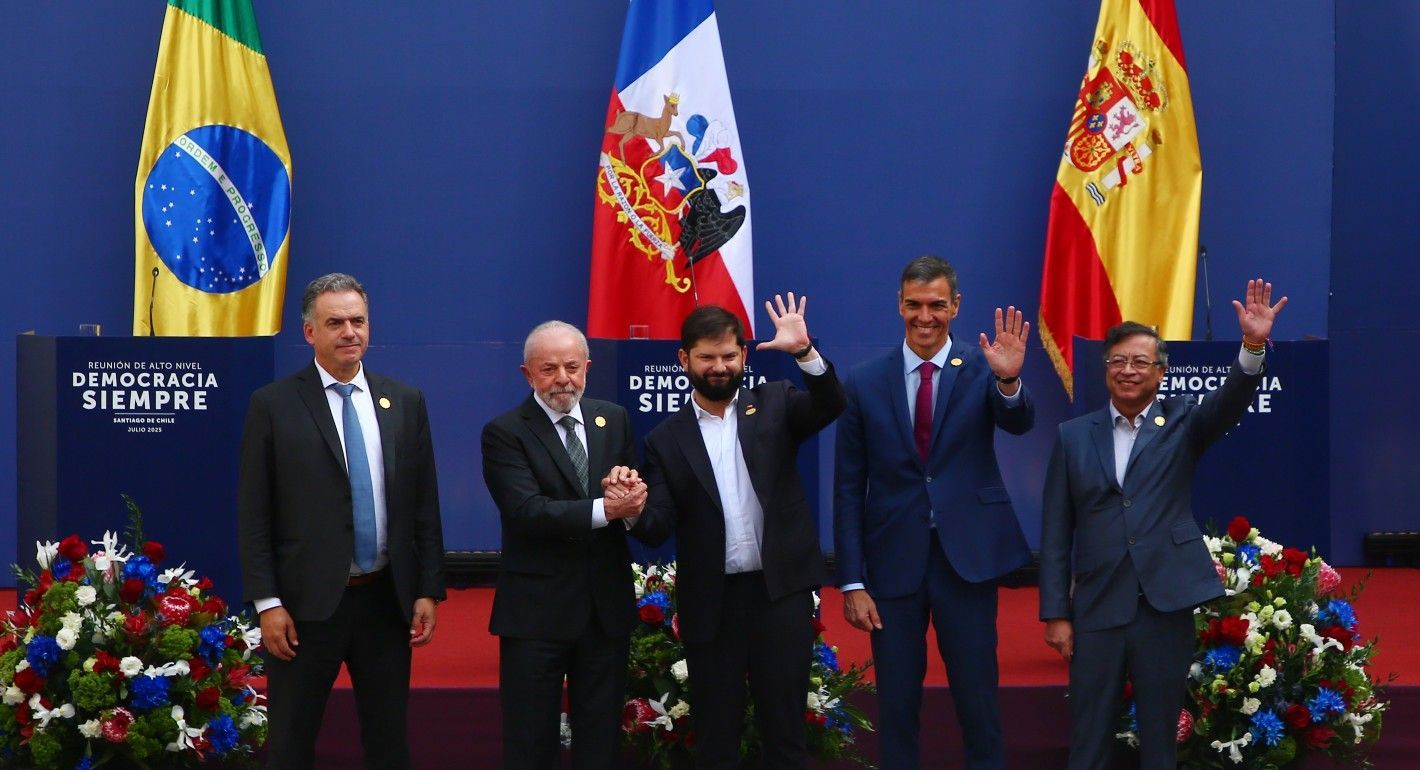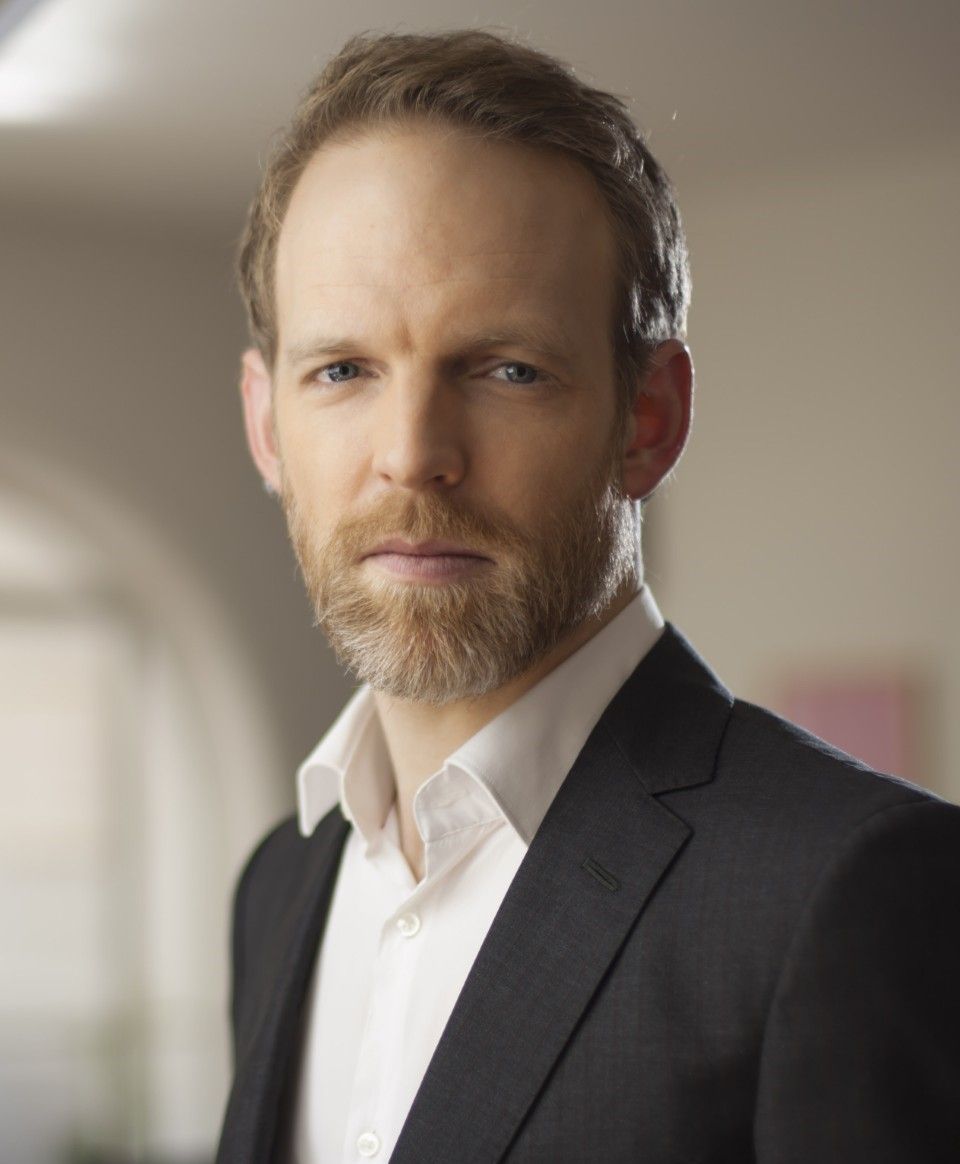Two experts discuss how drone technology is shaping yet another conflict and what the United States can learn from Ukraine.
Steve Feldstein, Dara Massicot
{
"authors": [
"Oliver Stuenkel",
"Adrian Feinberg"
],
"type": "commentary",
"blog": "Emissary",
"centerAffiliationAll": "dc",
"centers": [
"Carnegie Endowment for International Peace"
],
"collections": [
"Democracy Policy"
],
"englishNewsletterAll": "",
"nonEnglishNewsletterAll": "",
"primaryCenter": "Carnegie Endowment for International Peace",
"programAffiliation": "DCG",
"programs": [
"Democracy, Conflict, and Governance"
],
"projects": [],
"regions": [
"Brazil",
"South America",
"United States"
],
"topics": [
"Democracy",
"Foreign Policy"
]
}
From left, Orsi, Silva, Boric, Sánchez, and Petro at a democracy meeting on July 21, 2025 in Santiago, Chile. (Photo by Marcelo Hernandez/Getty Images)
With U.S. democracy support receding, progressive leaders from Spain and Latin America have pioneered a global initiative to combat backsliding. Can it succeed?
As U.S. President Donald Trump and his administration have dismantled international democracy support over the past ten months—gutting aid programs, withdrawing from multilateral agreements, and transforming the U.S. from a standard-bearer of global democracy into a case study in democratic backsliding—world democracies have struggled to formulate a collective response. Reports have been authored, statements issued, and joint letters signed—but real action remains limited. Of these efforts, the most organized so far is In Defense of Democracy: Fighting Against Extremism, a bloc of “like-minded democratic states” convened by the progressive leaders of Spain, Brazil, Chile, Colombia, and Uruguay to “advance an active democratic diplomacy” in the face of institutional erosion.
In Defense of Democracy has met three times since Brazilian President Lula da Silva and Spanish Prime Minister Pedro Sánchez launched the initiative at the 2024 UN General Assembly, citing the 2021 U.S. Capitol attack and the 2023 Brasília attacks as their catalyst. That inaugural summit featured an array of democratic leaders—including progressives from Norway, Timor-Leste, and Senegal, as well as centrist and center-left figures such as Emmanuel Macron and Justin Trudeau—and touched on themes familiar to democracy watchers everywhere: ideological extremism, institutional distrust, and affective polarization, among others. Mostly, participants seemed preoccupied with making sense of the crisis at hand. “Where,” Lula asked in his final remarks, “did democracy go so wrong?”
The subsequent In Defense of Democracy meetings have answered this question with growing clarity—or at least more ideological certainty. In their joint statement at the follow-up summit in Santiago in July, Lula, Sánchez, Chilean President Gabriel Boric, Colombian President Gustavo Petro, and Uruguayan President Yamandú Orsi repeatedly invoked “big capital” and “austerity policies” as the principal causes behind the demise of the democratic consensus. Although their course of action appeared vague, they showed little doubt that future democratic consolidation would be led by “progressive leaders.” The September gathering at the UN General Assembly opening reflected as much: Gone were the moderate figures of the original quorum, replaced by a uniform front of left-wing leaders, including representatives from Albania, Bolivia, and Honduras.
Their initiative—like any effort in pro-democratic multilateralism—is welcome in this moment of democratic collapse. Now more than ever, leaders committed to the democratic path need to step up and set an ambitious new agenda. But if a group of Ibero-American governments and their progressive allies are to help fill the emptying ranks of international democratic leadership, In Defense of Democracy must learn the right lessons from previous intergovernmental democracy initiatives. That means building an inclusive coalition without sacrificing normative coherence—and putting real resources behind abstract commitments.
In the optimistic atmosphere of the 1990s, “democracy clubs” emerged as venues for the world’s growing ranks of democratic governments to come together, share best practices, and advance global democratic diplomacy. The most notable of these venues was the Community of Democracies (CoD), which U.S. Secretary of State Madeleine Albright and Polish Foreign Minister Bronisław Geremek founded in 2000 to “support adherence to common democratic values and standards” as outlined in the Warsaw Declaration. For a brief moment, that initiative appeared to give structure to the post–Cold War democratic order. But within a decade, CoD had faded into bureaucratic irrelevance—its Warsaw-based secretariat lacking resources and authority, its meetings attended by sparse numbers of midlevel envoys, and its founding democratic commitments routinely ignored by member states. Hungary’s democratic retrenchment under Prime Minister Viktor Orbán—as well as the continued participation of authoritarian governments from Thailand and Venezuela—underscored the organization’s inability to discipline even its most conspicuous violators. What had begun as an ambitious alliance of free nations devolved into a cautionary tale about the difficulties of policing democracy from within.
More recent initiatives like the Summit for Democracy have faced similar tensions between inclusivity and normative coherence—tensions that leaders have negotiated selectively and inconsistently. When planning the 2021 Summit for Democracy, for instance, President Joe Biden excluded backsliders such as Orbán and Turkish President Recep Tayyip Erdoğan, but still opted to include certain anti-democratic actors such as Filipino President Rodrigo Duterte and Angolan President João Lourenço. There is a case to be made against indiscriminate expansion—democracy clubs need to uphold their own values—just as one can argue against excessive pickiness—democracy clubs need to engage the nondemocratic world if they wish to spread norms. But taking the middle path has often meant that democracy clubs neither fully embody democratic principles nor effectively proselytize them.
In Defense of Democracy’s progressive leaders have so far avoided such a dilemma through their strident partisanship. Yet, by pushing total normative conformity—by excluding not only traditional authoritarians, but also conservatives and moderate democrats deemed liable “to accept totalitarian positions”—Lula, Sánchez, and company have built a weak foundation for intergovernmental action.
When participants use the coalition’s forums to be overtly ideological—as outgoing Bolivian President Luis Arce did at UNGA 2025 while describing how “hegemonic actors … in bourgeois sectors… wage war against democracy… in order to serve the interests of concentrated capital”—they hamper both serious empirical analysis of democratic decline and the coalition-building necessary to change course. Partisanship may resonate with In Defense of Democracy leaders’ domestic bases and signal purity of cause, but it will ultimately alienate potential democratic allies and limit strategic relevance in the long term.
This spectrum of partisanship is critical not only for outreach to fragile democracies operating under disparate economic and historical conditions—say, former Eastern Bloc nations where far-left signaling can be unpalatable—but also to sustain the initiative’s core leadership. In democratic regimes, governments inevitably change hands, and multilateral coalitions must be flexible enough to withstand national shifts in power. Chile may have its own right-wing democratic government by 2026, and Brazil and Spain could very well follow. If the current presidents of these countries wish to build a transnational movement that outlasts their own political careers, purity politics of this kind are a nonstarter.
Before In Defense of Democracy leaders meet again in Madrid next year, they should court a more diverse set of democratic partners, including moderate figures such Canadian Prime Minister Mark Carney and center-right leaders such as Portuguese Prime Minister Luis Montenegro and Bolivia’s new president, Rodrigo Paz. While Lula, Sánchez, and their allies must avoid conferring legitimacy on authoritarian regimes—as CoD and Summit for Democracy have done—they should also broaden their conception of the democratic tradition they are ostensibly defending. Only with cross-partisan legitimacy and resilience against political turnover can In Defense of Democracy then go about the harder work of engaging nondemocratic actors.
In addition, In Defense of Democracy leaders should put real resources behind their ambitious pledges. So far, hollow rhetoric—sometimes incendiary, sometimes simply bureaucratic—has overshadowed policy talk, which has been vague when discussed at all. At the end of the UNGA 2025 gathering, Sánchez gave the most recent accounting of the initiative’s actions to come, which included creating a think tank network for renewing “progressive and democratic ideals,” collaborating on algorithmic transparency regulations, developing a global initiative for information integrity on climate change, and joining “the fight against extremism among youth.” These are potentially important steps, but the Spanish government has provided little substance on timeline, funding, or even participation: To date, In Defense of Democracy claims no formal member states beyond its five leaders. Unless these leaders make detailed material commitments and a funding scheme to back them, In Defense of Democracy risks becoming yet another empty bureaucratic husk on the world stage.

Senior Fellow, Democracy, Conflict, and Governance Program
Oliver Stuenkel is an associate professor at the School of International Relations at Fundação Getulio Vargas (FGV) in São Paulo, Brazil. He is also a senior fellow affiliated with the Democracy, Conflict, and Governance Program at the Carnegie Endowment for International Peace.
Adrian Feinberg
James C. Gaither Junior Fellow, Democracy, Conflict and Governance Program
Adrian Feinberg is a James C. Gaither Junior Fellow in the Carnegie Democracy, Conflict and Governance Program.
Carnegie does not take institutional positions on public policy issues; the views represented herein are those of the author(s) and do not necessarily reflect the views of Carnegie, its staff, or its trustees.
Two experts discuss how drone technology is shaping yet another conflict and what the United States can learn from Ukraine.


Steve Feldstein, Dara Massicot
Arguing that Chinese policy is hung on alliances—with imputations of obligation—misses the point.

Evan A. Feigenbaum
On the fourth anniversary of Russia’s full-scale invasion, Carnegie experts discuss the war’s impacts and what might come next.



Eric Ciaramella, Aaron David Miller, Alexandra Prokopenko, …
New data from the 2026 Indian American Attitudes Survey show that Democratic support has not fully rebounded from 2020.


Sumitra Badrinathan, Devesh Kapur, Andy Robaina, …
The speech addressed Iran but said little about Ukraine, China, Gaza, or other global sources of tension.

Aaron David Miller